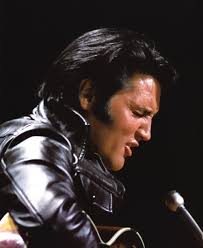 Elvis Presley suddenly dropped in the bathroom of his Graceland mansion on the afternoon of August 16, 1977. He was rushed to Baptist Memorial Hospital in Memphis, Tennessee, pronounced dead, then shipped to the morgue and autopsied the same afternoon. Three days later, the coroner issued Elvis’s death certificate stating the cause as “hypertensive cardiovascular disease with atherosclerotic heart disease” — heart attack for short.
Elvis Presley suddenly dropped in the bathroom of his Graceland mansion on the afternoon of August 16, 1977. He was rushed to Baptist Memorial Hospital in Memphis, Tennessee, pronounced dead, then shipped to the morgue and autopsied the same afternoon. Three days later, the coroner issued Elvis’s death certificate stating the cause as “hypertensive cardiovascular disease with atherosclerotic heart disease” — heart attack for short.
However, toxicology results soon identified ten pharmaceutical drugs in Elvis’s system with codeine being ten times the therapeutic level. This started accusations of a cover-up and suggesting conspiracy theories of a sinister criminal act.
Pushing forty years after, modern medicine and forensics took a new look at the Presley case facts and indicated that something entirely different from a heart attack or a drug overdose really killed the King of Rock & Roll.
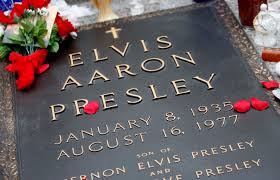 Hindsight being twenty-twenty, let’s first look at how death investigations should be conducted.
Hindsight being twenty-twenty, let’s first look at how death investigations should be conducted.
Coroners are the judge of death and it’s their responsibility to establish five main facts surrounding a death. (Coroners are not to assign blame.) In the Presley case, the facts determined at the time were:
Identity of Deceased — Elvis Aaron Presley.
Time of Death — Approximately 2:00 p.m. on Tuesday, August 16, 1977.
Place of Death — 3754 Elvis Presley Boulevard, Memphis, Tennessee.
Cause of Death — Heart attack.
Means of Death — Chronic heart disease.
 There’s a distinct difference between Cause of Death and Means of Death. Cause is the actual event. Means is the method in which death happened. Examples are cause being a ruptured aorta with means being a motor vehicle crash, or cause being massive cerebral interruption with means being gunshot wound to the head.
There’s a distinct difference between Cause of Death and Means of Death. Cause is the actual event. Means is the method in which death happened. Examples are cause being a ruptured aorta with means being a motor vehicle crash, or cause being massive cerebral interruption with means being gunshot wound to the head.
Once the facts are known, it’s the coroner’s duty to classify the Manner of Death. There are five universal classifications:
- Natural.
- Homicide.
- Suicide.
- Accidental.
- Undetermined.
 Elvis Presley’s death was ruled a natural event, thought at the time as being an acute cardiac event from existing cardiovascular disease. If the coroner determined Elvis died from a drug overdose, the ruling would have been accidental. No one ever claimed it was suicide or homicide.
Elvis Presley’s death was ruled a natural event, thought at the time as being an acute cardiac event from existing cardiovascular disease. If the coroner determined Elvis died from a drug overdose, the ruling would have been accidental. No one ever claimed it was suicide or homicide.
One principle of death investigation is to look for antecedent evidence—preexisting conditions which contributed to the death mechanism or was responsible for causing or continuing a chain of events that led to the death.
Another principle of death investigation is examining the triangle of Scene—Body—History. This compiles the totality of evidence.
Let’s look at the evidence in Elvis Presley’s death.
Scene
 Elvis was found on his bathroom floor, face down in front of the toilet. It was apparent he’d instantly collapsed from a sitting position and there was no sign of a distress struggle or attempt to summon help. When the paramedics arrived, he was cold, blue, and had no vital signs. Rigor mortis had not set in so he’d probably expired within the hour. He was transported by ambulance to Baptist Memorial Hospital where a vain attempt at resuscitation occurred because “he was Elvis”. He was declared dead at 3:16 p.m. and was shipped to the morgue where an autopsy was promptly performed.
Elvis was found on his bathroom floor, face down in front of the toilet. It was apparent he’d instantly collapsed from a sitting position and there was no sign of a distress struggle or attempt to summon help. When the paramedics arrived, he was cold, blue, and had no vital signs. Rigor mortis had not set in so he’d probably expired within the hour. He was transported by ambulance to Baptist Memorial Hospital where a vain attempt at resuscitation occurred because “he was Elvis”. He was declared dead at 3:16 p.m. and was shipped to the morgue where an autopsy was promptly performed.
There was no suggestion of suicide or foul play so there was no police investigation. The scene wasn’t photographed, nor preserved, and there was no accounting for what medications or other drugs might have been present at Graceland.
Body
 Elvis was in terrible health. His weight was estimated at 350 pounds and he was virtually non-functional at the end, being mostly bed-ridden and requiring permanent nursing care. He suffered from an enlarged heart which was twice the size of normal and showed advanced evidence of cardiovascular disease in his coronary vessels, aorta, and cerebral arteries—certainly more advanced than a normal 42-year-old would be. His lungs showed signs of emphysema, although he’d never smoked, and his bowel was found to be twice the length of normal with an impacted stool estimated to be four months old. Elvis also suffered from hypogammaglobulinemia which is an immune disorder, as well as showed evidence of a autoimmune inflammatory disorder.
Elvis was in terrible health. His weight was estimated at 350 pounds and he was virtually non-functional at the end, being mostly bed-ridden and requiring permanent nursing care. He suffered from an enlarged heart which was twice the size of normal and showed advanced evidence of cardiovascular disease in his coronary vessels, aorta, and cerebral arteries—certainly more advanced than a normal 42-year-old would be. His lungs showed signs of emphysema, although he’d never smoked, and his bowel was found to be twice the length of normal with an impacted stool estimated to be four months old. Elvis also suffered from hypogammaglobulinemia which is an immune disorder, as well as showed evidence of a autoimmune inflammatory disorder.
Toxicology tested positive for ten separate prescription medications but showed negative for illicit drugs and alcohol. The only alarming pharmaceutical indicator, on its own, was codeine at ten times the prescribed manner but not in lethal range.
History
 Elvis was born on January 8, 1935 in Tupelo, Mississippi and had a twin brother who died at birth. As a youth, Elvis was active and healthy which continued during his time in the army and all through his early performing stage when he was a bundle of energy. He began experimenting with amphetamines, probably to enhance his performances, but shied from alcohol as it gave him violent tendencies.
Elvis was born on January 8, 1935 in Tupelo, Mississippi and had a twin brother who died at birth. As a youth, Elvis was active and healthy which continued during his time in the army and all through his early performing stage when he was a bundle of energy. He began experimenting with amphetamines, probably to enhance his performances, but shied from alcohol as it gave him violent tendencies.
In 1967, Elvis came under the primary care of Dr. George Nichopoulos who was well-known to celebrities. Then, Elvis was 32 and weighed 163 pounds. His only known medical ailment was slightly high blood pressure, presumably due to his high-fat diet.
Also in 1967, Elvis’s health took a sudden turn with progressive chronic pain, insomnia, hypertension, lethargy, irrational behavior, and immense weight gain. Over his remaining years, Elvis was seen by a number of different doctors and was hospitalized a number of times, all the while resorting to self-medication with a wide assortment of drugs from dozens of sources.
 Doctor Nick, as Nichopoulos was called, stayed as Elvis’s personal physician till the end and was present at the death scene, as well as during the autopsy. Doctor Nick concurred with the coroner’s conclusion that the cause of death was a natural cardiac event resulting from an arrhythmia, or sudden interruption of heartbeat, and agreed that Elvis’s death was not due to a drug overdose.
Doctor Nick, as Nichopoulos was called, stayed as Elvis’s personal physician till the end and was present at the death scene, as well as during the autopsy. Doctor Nick concurred with the coroner’s conclusion that the cause of death was a natural cardiac event resulting from an arrhythmia, or sudden interruption of heartbeat, and agreed that Elvis’s death was not due to a drug overdose.
When the toxicology report was released, it came with a qualifier:
“Diazepam, methaqualone, phenobarbital, ethchlorvynol, and ethinamate are below or within their respective ranges. Codeine was present at a level approximately 10 times those concentrations found therapeutically. In view of the polypharmacy aspects, this case must be looked at in terms of the cumulative pharmacological effect of the drugs identified by the report.”
 Because the tox report appeared to contradict the autopsy report’s stated cardiac cause of death, a prominent toxicologist was asked to review the findings. His opinion was:
Because the tox report appeared to contradict the autopsy report’s stated cardiac cause of death, a prominent toxicologist was asked to review the findings. His opinion was:
“Coupled with this toxicological data are the pathological findings and the reported history that the deceased had been mobile and functional within 8 hours prior to death. Together, all this information points to a conclusion that, whatever tolerance the deceased may have acquired to the many drugs found in his system, the strong probability is that these drugs were the major contribution to his demise.”
The Tennessee Board of Health then began an investigation into Elvis’s death which resulted in proceedings against Doctor Nick.
 Evidence showed that during the seven and a half months preceding Elvis’s death—from January 1, 1977, to August 16, 1977—Doctor Nick wrote prescriptions for Elvis for at least 8,805 pills, tablets, vials, and injectables. Going back to January 1975, the count was 19,012.
Evidence showed that during the seven and a half months preceding Elvis’s death—from January 1, 1977, to August 16, 1977—Doctor Nick wrote prescriptions for Elvis for at least 8,805 pills, tablets, vials, and injectables. Going back to January 1975, the count was 19,012.
These numbers might defy belief, but they came from an experienced team of investigators who visited 153 pharmacies and spent 1,090 hours going through 6,570,175 prescriptions and then, with the aid of two secretaries, spent another 1,120 hours organizing the evidence.
The drugs included uppers, downers, and powerful painkillers such as Dilaudid, Quaalude, Percodan, Demerol, and Cocaine Hydrochloride in quantities more appropriate for those terminally ill with cancer.
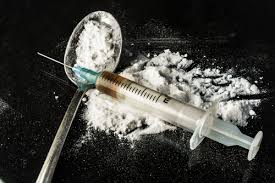 Doctor Nick admitted to this. His defense was because Elvis was so wired on pain killers, he prescribed these medications to keep Elvis away from dangerous street drugs, thereby controlling Elvis’s addiction—addiction being a disease.
Doctor Nick admitted to this. His defense was because Elvis was so wired on pain killers, he prescribed these medications to keep Elvis away from dangerous street drugs, thereby controlling Elvis’s addiction—addiction being a disease.
One of the defense witnesses was Dr. Forest Torrent, a prominent California physician and a pioneer in the use of opiates in pain treatment who explained how the effects this level of codeine would have contributed to Elvis’s death.
Central to misconduct allegations was the issue of high codeine levels in Elvis at the time of death—codeine being the prime toxicological suspect as the pharmaceutical contributor. It was established that Elvis obtained codeine pills from a dentist the day before his death and Doctor Nick had no knowledge of it.
The jury bought it and Doctor Nick was absolved of negligence in directly causing Elvis Presley’s fatal event.
Continuing Investigation
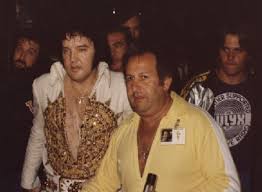 Dr. Torrent was convinced there were other contributing factors leading to Elvis’s death. In preparation for Doctor Nick’s trial, Dr. Torrent had access to all of Elvis Presley’s medical records, including the autopsy and toxicology reports. Incidentally, these two reports are the property of the Presley estate and are sealed from public view until 2027, fifty years after Elvis’s death.
Dr. Torrent was convinced there were other contributing factors leading to Elvis’s death. In preparation for Doctor Nick’s trial, Dr. Torrent had access to all of Elvis Presley’s medical records, including the autopsy and toxicology reports. Incidentally, these two reports are the property of the Presley estate and are sealed from public view until 2027, fifty years after Elvis’s death.
Dr. Torrent was intrigued by the sudden change in Elvis starting in 1967 and discovered that while in Los Angeles filming the movie Clambake, Elvis tripped over an electrical cord, fell, and cracked his head on the edge of a porcelain bathtub. Elvis was knocked unconscious and had to be hospitalized. Dr. Torrent found three other incidents where Elvis suffered head blows and he suspected Elvis suffered from what’s now known as Traumatic Brain Injury—TBI—and that’s what caused progressive ailments which led to his death.
Dr. Torrent released a paper titled Elvis Presley: Head Trauma, Autoimmunity, Pain, and Early Death. It’s a fascinating read—recently published in Practical Pain Management.
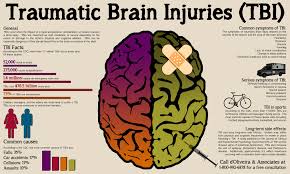 Dr. Torrent builds a theory that Elvis’s bathtub head injury was so severe that it caused brain tissue to be jarred loose and leak into his general blood circulation. This is now known to be a leading cause of autoimmune disorder which causes a breakdown of other organs. This was unknown in 1967 and Elvis went untreated. Side effects are chronic pain, irrational behavior, and severe bodily changes such as obesity and enlarged organs like hearts and bowels.
Dr. Torrent builds a theory that Elvis’s bathtub head injury was so severe that it caused brain tissue to be jarred loose and leak into his general blood circulation. This is now known to be a leading cause of autoimmune disorder which causes a breakdown of other organs. This was unknown in 1967 and Elvis went untreated. Side effects are chronic pain, irrational behavior, and severe bodily changes such as obesity and enlarged organs like hearts and bowels.
Today, TBI is a recognized health issue in professional contact sports.
 With a change in mental state and suffering chronic pain, Elvis Presley entered a ten year spiral towards death. He became hopelessly addicted to pain killers, practiced a terribly unhealthy diet and lethargic lifestyle, and resorted to the typical addict’s habit of sneaking a fix wherever he could. This led to early coronary vascular disease and, combined with his escalating weight and pill consumption, Elvis was a heart attack ready to burst.
With a change in mental state and suffering chronic pain, Elvis Presley entered a ten year spiral towards death. He became hopelessly addicted to pain killers, practiced a terribly unhealthy diet and lethargic lifestyle, and resorted to the typical addict’s habit of sneaking a fix wherever he could. This led to early coronary vascular disease and, combined with his escalating weight and pill consumption, Elvis was a heart attack ready to burst.
Recall that I used the term antecedent, like all coroners do when assessing a cause of death. Given Dr. Torrent’s observations—and all the facts compiled from forty years—if I were the coroner completing Elvis Presley’s death certificate today, I’d write it like this:
Identity of Deceased — Elvis Aaron Presley.
Time of Death — Approximately 2:00 p.m. on Tuesday, August 16th, 1977.
Place of Death — 3754 Elvis Presley Boulevard, Memphis, Tennessee.
Cause of Death — Cardiac arrhythmia antecedent to hypertensive cardiovascular disease with atherosclerotic heart disease antecedent to polypharmacy antecedent to autoimmune inflammatory disorder antecedent to traumatic brain injury.
Means of Death — Cumulative Head Trauma.
 Therefore, I’d have to classify Elvis’s death as an Accident.
Therefore, I’d have to classify Elvis’s death as an Accident.
There’s no one to blame—certainly not Elvis. He was a severely injured and sick man. There’s no specific negligence on anyone’s part and definitely no cover-up or conspiracy of a criminal act.

Thanks for the article about Elvis Presley. I read somewhere on the internet a girl’s account of witnessing him hitting his head while he was performing on an outdoor stage before he became famous. The fall made such a loud sound that the audience sat in stunned silence for a moment. His story reminds me of some of the things that happened to me. Like Elvis and his parents, my in-laws lived through the Depression, were almost illiterate, only saw a doctor in an emergency and saved old prescriptions for years. When I had a bad cold they became very excited and urged me take their old eye medicine. A few years ago, after a bad fall on ice, I was in a lot of pain and could barely walk home from the pool when a physiotherapist diagnosed me with childhood back injury. He said that I am not aware of the pain because I am so used to it. He was not surprised that as a child I fell a lot when I ran fast or walked down stairs, that I was in pain when carrying schoolbooks or a heavy backpack, and that I had trouble sleeping and keeping my balance. In my teens I also had lots of falls while learning to ski downhill and saw stars lots of times. In the 1980s I was aching somewhat after long distance running and lifting weights at the gym. My doctor diagnosed fibromyalgia and prescribed amitriptyline at bedtime. The fibromyalgia was uncomfortable but I did not want pills. I didn’t like how the amitriptyline made me feel so I only took one tablet and stopped. At several checkups times the doctor urged me to stay with the medication. Eventually I did but I could hardly function. Felt mentally fuzzy all the time, had a hard time with grooming, couldn’t remember my purse when leaving for work in the car, couldn’t remember where I’d put things, couldn’t remember the names of clients, etc. And I had a professional career that I took very seriously! Eventually when I stopped taking the pills on my own I woke up one night feeling suicidal. I had no idea how dangerous they could be. I don’t drink, and have never smoked or taken street drugs. In the winter of 2017 I had flu, a bad cold, Norwalk virus and bronchitis. All summer I felt weird, aching all over and strangely tired. Couldn’t get even simple chores done. After hard workouts in the pool I’d sleep all afternoon. I thought I probably had the flu again. That fall I was in Mexico when I had a cardiac emergency and had a pacemaker installed. When I stood up after the operation I felt like I could think clearly for the first time in years. The internist/immunologist at the hospital said that there was something seriously wrong with my immune system, that my problems, including glaucoma, were all related and were actually one medical condition. He suspected pulmonary sarcoidosis and put me on a heavy course of cortisone. My face ballooned up, temporarily. I had a lot of energy for the first time in years. I noticed that it was reported that Elvis didn’t smoke but that he developed lung problems. I have looked at a lot of Elvis material and he was often photographed smoking cigarillos. Thanks for writing about Elvis’s head trauma. It explains a lot.
Thanks for your informative comment, Patricia. Nice to hear you found the article interesting! ~Garry
Thank you for this wonderful post. I’ve always wondered about the facts behind Elvis’ death. Your research really delves into his lifestyle in the 10 years prior to his death and explains those major changes in appearance and performance. It’s so odd that no one even tied those head injuries to any of the behavioral changes, at the very least. I received so much from your research. Thank you, again.
And thank you for the flattering words, Michelle. But I can’t take credit for the discovery as it was Dr. Torrent who made the connection. I don’t know if you, or any others who read this post, went on to read Dr. Torrent’s paper. It’s so clearly written and makes so much sense. Here’s the link again:
http://www.practicalpainmanagement.com/pain/other/brain-injury/elvis-presley-head-trauma-autoimmunity-pain-early-death
Hi, Garry —
Thank you for such a well-reasoned, professional case study. I’m surprised and yet not surprised… What great detective work in the case of Elvis, and I agree with your observations about the seeming disproportionate number of violent events among “heavy-hitters” in our sports world. It’s certainly worth considering.
A fascinating read!
Well, thank you very much for the wonderful compliment, Judy. It’s comments like yours that makes doing these blog posts so rewarding. I’m watching an NFL games as I’m writing this reply and one more casualty just got packed off the field after a helmet-to-helmet hit.
Interesting, as always Garry. Love the insight and the look into how an autopsy is performed and death determined. I’d never heard of “Means of Death” before and for some reason that intrigue me more than anything. Your explanation was clear and easy for me to understand. And you took that black cloud over Elvis and made it a gray area. Nicely done!
And thank you, Diane. I was confused about the difference between “cause” and “means” when I started as a coroner and my mentor explained it using the same examples I used in this post. It was so clear and I never forgot it. Hopefully this article does a small justice to Elvis’s legacy. Researching this piece gave me a whole new appreciation for what probably happened to Elvis. Far from the fat, washed-out slob image that some may have of him, I believe Elvis was a severely injured and ill man. His incredible talent and contribution to the entertainment world deserves our respect as well as our compassion for what likely caused his demise.
When Elvis did his comeback concerts about the time of the fall he was the figure of health and vitality. The decline into Vegas period obesity never made sense. This article is fascinating as it does explain it. The sad thing is that Elvis could still have been with us.
You’re likely right, John. Possibly if Elvis were properly diagnosed and treated, he’d still be alive and a healthy 81. Look at Tony Bennett. He’s 89 and just cut another album 🙂
A program entitled Autopsy broadcast in the UK, classed Elvis’ death as a cardiovascular event due to straining on the toilet. Obviously I’m not privy to the death certificate but I’m wondering if this is related to the autoimmune condition he is stated to have? There was no mention of any head trauma.
Hi Tina! I’m sure the triggering event would have been straining on the toilet but the root cause of Elvis’s health demise started long before that. In my time as a coroner, I attended many deaths were people were found either still on the toilet or on the floor beside it. Heart attacks were always the cause, whether it was an arrhythmia or myocardial infarction. The hearts were always already weak and the staining pushed them over the edge.
Thanks for explaining 🙂 It certainly makes sense. So it sounds like the death certificate only focused on the actual manner of death.
Yes. I suspect there may have been some collusion between Elvis’s doctor and the coroner – I wouldn’t go so far as to say “conspiracy” but it was in both of their interests for Elvis’s death to be simply classified as a natural death and not go too deep into this. Elvis’s doctor certainly had his back to cover and the coroner, I’m sure, didn’t want a full-blown, dragged our public relations nightmare. What makes me suspicious is that the death certificate was signed three days after death and long before the toxicology results were back. In all the death certificates I’ve signed, I never EVER signed off on a cause before knowing what the tox screen said.
Very informative article. I always wanted to know the backstory of how Elvis died.
Thank you, Jillian. This was a super interesting piece to research. I’d never looked into Elvis’s death before and I assumed it was a heart attack with drug overtones, but when I read Dr. Torrent’s paper his explanation made perfect sense to me.
Memphis, my home town. Elvis feeds the economy and the city’s identity. Your investigative report puts his unfortunate death into perspective and takes a lot of the blame off the poor guy. He had a big heart and a big talent.
Nice to hear from someone so close to Graceland! After I finished this piece, Lisa, I had a whole new respect for Elvis. I think there’s been a black cloud over him for years before his death, let alone after. Hopefully this sheds a bit of light on how injured and ill he was. Elvis was an incredibly talented entertainer and it sucks that life dealt him such a nasty blow.
I’d echo Donna Barker’s comments, only adding your observation re: athletes with concussion symptoms run higher chance of ‘risky business’ incidents. I’m sure someone, somewhere, is compiling data comparing tennis and tiddly-wink players to rugger and American football jocks.
Fascinating – as usual.
Thanks for the read!
ps: will froward to friend who wrote ‘Graceland Express’ a few years ago.
Thanks, Jack. I’m sure you’re right that someone has a government study grant 😉 Appreciate the share!
Fascinating stuff, Garry. I had no idea Elvis was bedridden at the time of his death. I’ve read several articles about traumatic brain injuries, and it seems there’s still some unknowns, even though there have been major medical breakthroughs. Ted has some really interesting talks on this subject.
Thanks, Sue. I read an excerpt from the book “A Southern Life” where Elvis’s bodyguards state that at the end, Elvis spent his entire time in bed watching three TVs set on CNN, NBC, and CBS news channels and consumed nothing but platters of cheeseburgers. Sad, man. Really sad. Thanks for the tip on the TED talks!
I didn’t realize Elvis was so obese at the time of his death. The number of prescriptions too is staggering. Great post. Thank you for sharing
I got this weight estimate from Dr. Torrent’s paper, Annette. Elvis would have been weighed as part of the autopsy process and that information would be in the autopsy report that Dr. Torrent was privy to. I tried to verify the exact weight, but the autopsy report is not available to the public. I’d have to say Dr. Torrent’s quote was pretty accurate, though. I found some corroboration to this in the book “A Southern Life” where it was quoted that Elvis’s bodyguards stated it took five men to load Elvis onto the stretcher at Graceland. Also, he was so obese and distorted that the ER staff at the hospital didn’t recognize him as Elvis even though he’d been in there a number of times.
I don’t even care about Elvis but this analysis was riveting!
I look forward to an equally engaging piece by you about head trauma in sports one day…
Hey, thanks Donna 🙂 There’s been tremendous advances in understanding traumatic brain injuries in recent years and much of it’s come from professional sports injuries. When you look at the disproportionate incidents of violent criminal behavior among NFL players you have to think there’s a link to concussions.
Wow! How did I miss that connection? Thank you, Garry. I’m sure we will find a connection between sports trauma and off-the-field behaviour. It makes perfect sense, in light of what we are learning about brain injuries.
As for Mr. Presley’s demise, while I was never a big fan, I now understand the man better. I also have a greater degree of compassion now that I have the information you presented.
Hi Craig! I wasn’t a huge Elvis fan, either, as he was a half-generation ahead of me. I was 20 when he died and he was a kinda “has-been” for me then, so I wasn’t too upset – not like my older friends & relatives were. I just assumed Elvis was another statistic of being ruined by fame & fortune. It wasn’t until I researched this post that it really hit. Now I’m sure Elvis was a victim of a tragic accident with progressive complications and history should be aware of this. He had far too much impact on the entertainment world to be dismissed as a slovenly, washed-up, drug addict. Thanks for commenting & hope to hear more from you!